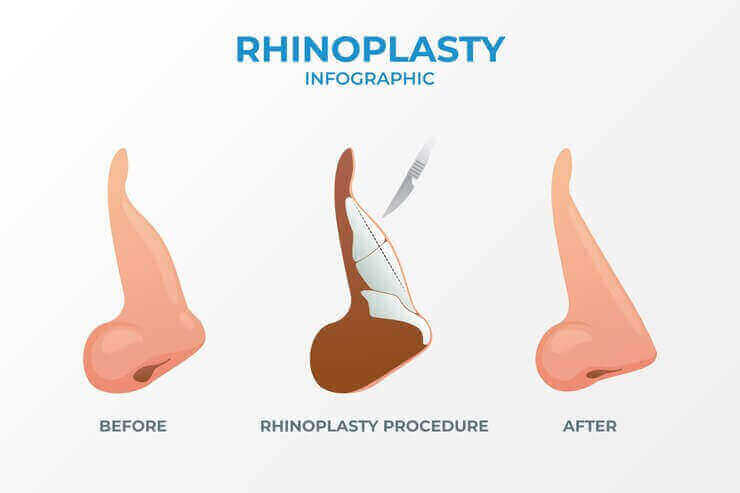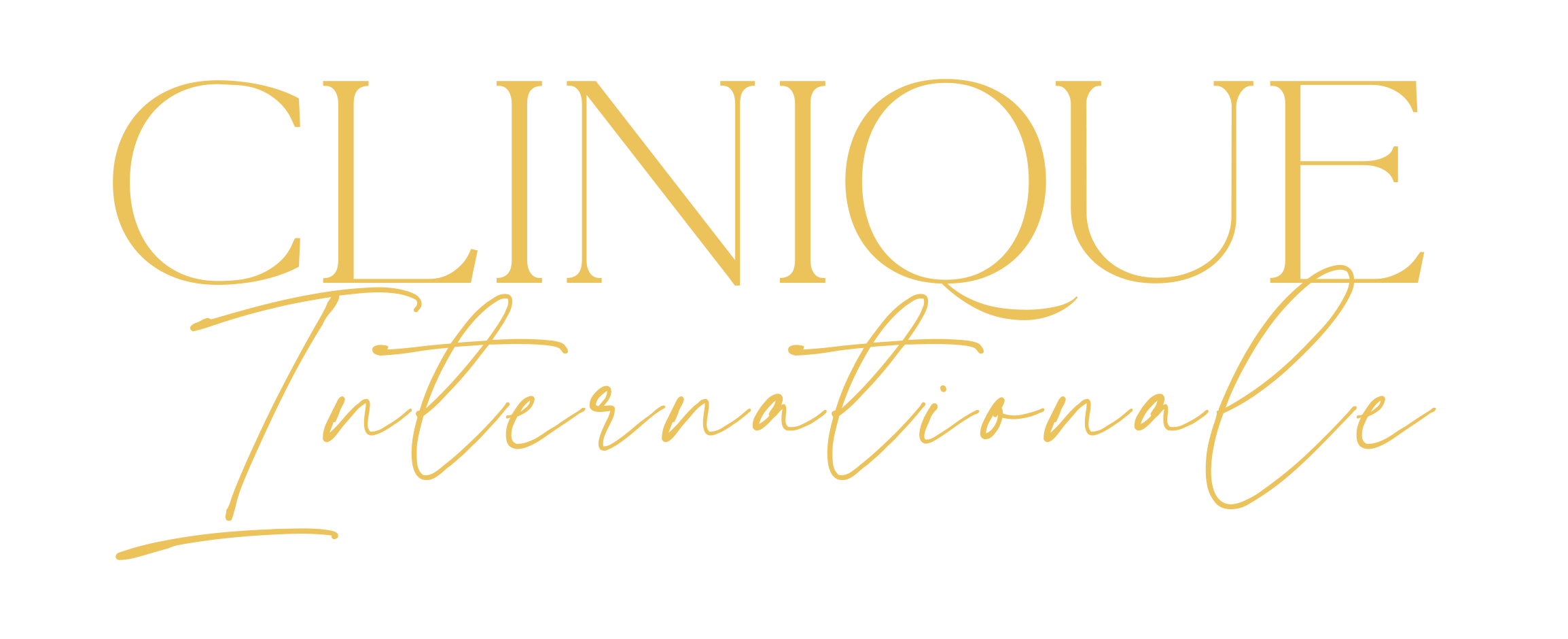Rhinoplasty Surgery in Pune
For those seeking Rhinoplasty Surgery in Pune, Clinique Internationale is an excellent choice.
If you are unhappy with the current structure of your nose. Or have experienced trauma that resulted in nose damage, you're not alone. Many individuals face similar issues, making rhinoplasty or nose job surgery a viable option. Rhinoplasty surgery in Pune can address aesthetic concerns and functional issues, improving both appearance and breathing.
Rhinoplasty, which is commonly known as a nose job, is a surgery done to reshape the nasal structure so that it may look good and also function well. It may be needed if there are some structural issues with the nose that lead to breathing problems or other problems related to facial profile balance. For example, someone could undergo this kind of surgery because they want their crooked noses fixed or to reduce large nasal bridges.

Dr. Ajinkya Patil, renowned for his expertise in rhinoplasty, leads the team Clinique Internationale. With a track record of successful surgeries, Dr. Patil ensures personalized care and optimal results for each patient. Choose Clinique Internationale for comprehensive rhinoplasty solutions in Pune, backed by Dr. Patil's skill and experience.
What Is Rhinoplasty Or Nose Job?
Rhinoplasty is commonly known as a nose job. It is a surgical procedure aimed at improving the appearance and functionality of the nose. It can address various concerns such as a prominent hump, wide nostrils, asymmetry, or a drooping tip. Additionally, rhinoplasty can correct breathing difficulties caused by structural abnormalities like a deviated septum. Overall, rhinoplasty enhances facial harmony, boosts self-confidence, and improves breathing, making it a popular choice. Individuals seeking both aesthetic enhancement and functional improvement in their noses.
Rhinoplasty Surgeon In Pune
If you’re looking for a skilled rhinoplasty surgeon in Pune, Dr. Ajinkya Patil stands out as an exceptional choice. As a renowned facial cosmetic surgeon, he specializes in aesthetic procedures that enhance facial harmony and function. With years of experience and a commitment to patient care, Dr. Patil offers personalized treatment plans tailored to each individual's needs.
Rhinoplasty, commonly referred to as a nose job, is a procedure that can reshape the nose for both cosmetic and functional improvements. Dr. Patil employs advanced techniques to ensure optimal results, focusing on achieving a natural appearance that complements the patient’s facial features. His attention to detail and artistic approach make him one of the leading rhinoplasty surgeons in Pune.
Whether you’re considering rhinoplasty for aesthetic reasons or to improve breathing, Dr. Ajinkya Patil is dedicated to helping you achieve your desired outcome. Schedule a consultation today to explore your options with a trusted rhinoplasty surgeon in Pune.
Rhinoplasty Surgery Cost In Pune
At Clinique Internationale the rhinoplasty surgery cost in Pune between Rs 80,000 and Rs 2,00,000, which depends on various aspects such as how extensive the process is, how skilled the doctor involved is and the kind of hospital one uses among other things. The procedure may involve correcting structural issues, improving breathing function, or purely for aesthetic purposes. Clinique Internationale is reputed for its advanced surgical techniques, experienced surgeons, and high-quality patient care.
Consultation fees, pre-operative assessments, and post-operative care are often included in the total cost. Therefore, potential patients should consider these factors when budgeting for rhinoplasty. Overall, the rhinoplasty surgery cost in Pune at Clinique Internationale falls between Rs. 80,000 to Rs. 2,00,000, providing options for various budgets while maintaining a commitment to safety and excellence in cosmetic procedures.
| Surgery cost | Amount |
|---|---|
| Starting Cost | Rs. 80,000 |
| Average Cost | Rs. 1,20,000 |
| Maximum Cost | Rs. 2,00,000 |
Disclaimer: Actual price can vary based on individual needs and circumstances.
Procedure Of Nose Jog Or Rhinoplasty Surgery
At Clinique Internationale, Dr. Ajinkya Patil and his team perform various rhinoplasty surgery in Pune, procedures to address different nasal concerns:
- Consultation and Assessment: The first step is a comprehensive consultation where the surgeon evaluates the patient's nasal structure, discusses their goals and expectations, and outlines the suitable surgical plan.
- Anesthesia Administration: Before the surgery begins, the patient is administered either local anesthesia with sedation or general anesthesia for comfort and pain management during the procedure.
- Incision Placement: Depending on the type of rhinoplasty (open or closed), incisions are strategically made either inside the nostrils (closed rhinoplasty) or across the columella (open rhinoplasty) to access the underlying nasal structures.
- Reshaping and Reconstruction: The surgeon then carefully reshapes the nasal bones, cartilage, and tissues according to the pre-determined surgical plan. This may involve reducing a dorsal hump, refining the nasal tip, adjusting the nasal bridge, or correcting septal deviations.
- Closure and Recovery: After making the desired changes, the surgeon meticulously closes the incisions with sutures and may place nasal splints or packing to support the newly shaped nose during the initial healing phase.

Types Of Rhinoplasty
There are several types of rhinoplasty procedures, each tailored to address specific concerns and achieve desired aesthetic results. Here are four major types of Rhinoplasty:
- Open Rhinoplasty: In open rhinoplasty, the surgeon makes an incision across the columella (the strip of tissue between the nostrils) and lifts the skin off the nasal structures. This allows for better visibility and access to the underlying nasal framework.
- Closed Rhinoplasty: This technique is suitable for patients who require minor to moderate adjustments, such as refining the nasal tip or addressing a dorsal hump. Closed rhinoplasty typically results in less visible scarring and a shorter recovery period compared to open rhinoplasty.
- Primary Rhinoplasty: Primary rhinoplasty refers to the first-time surgical procedure performed on the nose to address aesthetic concerns or functional issues. It may involve reshaping the nasal bridge, refining the tip, correcting asymmetry, or improving nasal breathing.
- Filler Rhinoplasty: In filler rhinoplasty, practitioners inject dermal fillers into specific areas of the nose to reshape and enhance its appearance non-surgically. It can address minor imperfections, such as bumps or asymmetry, without the need for surgery.
Why Choose Clinique Internationale for Rhinoplasty in Pune?
- Expert Surgeons: Our team comprises highly skilled surgeons with extensive experience in rhinoplasty. They are adept at both cosmetic and functional nasal surgeries, ensuring that each patient’s unique needs are met.
- Advanced Techniques: We utilize the latest surgical techniques and technologies to achieve precise and natural-looking results. Our minimally invasive methods ensure faster recovery times and reduced risk of complications.
- Comprehensive Care: From the initial consultation to post-operative care, we provide comprehensive support to our patients. Our dedicated team at is committed to ensuring a smooth and comfortable experience throughout the entire process.
- Customized Treatment Plans: Every patient is unique, and so are their nasal structures. We develop personalized treatment plans tailored to each individual’s aesthetic goals and medical needs.
Rhinoplasty Surgery Benefits
- Improved Facial Harmony: Rhinoplasty can enhance the overall balance and proportion of facial features, creating a more harmonious appearance.
- Enhanced Self-Confidence: A nose that is more aesthetically pleasing can boost self-esteem and confidence levels, leading to a more positive self-image.
- Correction of Breathing Problems: In addition to cosmetic improvements, rhinoplasty can also address functional issues such as a deviated septum, improving nasal airflow and breathing.
- Correction of Traumatic Injuries: Rhinoplasty can correct nasal deformities resulting from accidents or injuries, restoring the nose's natural shape and function.
- Customized Results: Surgeons can tailor rhinoplasty procedures to each patient's unique goals and preferences, ensuring personalized and satisfying outcomes.
